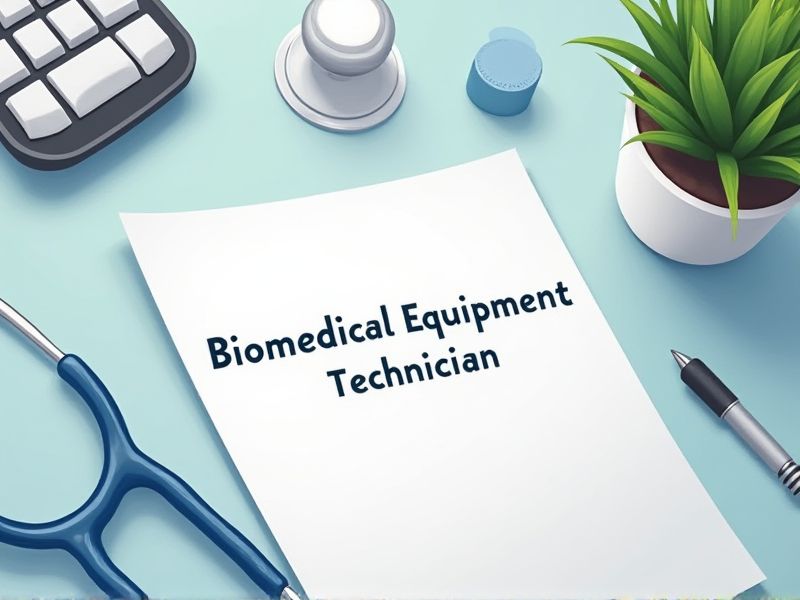
Biomedical Equipment Technicians (BMETs) play a crucial role in maintaining and repairing medical equipment, ensuring patient safety and the accuracy of diagnostic results. Certifying their skills through recognized programs enhances their credibility and keeps them updated on the latest technological advancements. Certifications provide a standardized benchmark for identifying qualified professionals, which is vital in high-stakes healthcare environments. Here are some essential certifications a Biomedical Equipment Technician might pursue.
Certified Biomedical Equipment Technician (CBET)
Having a Certified Biomedical Equipment Technician (CBET) ensures standardized skills and knowledge, which enhances the quality of service and ensures safety in handling complex medical equipment. Certification demonstrates a commitment to professional development, increasing trust with employers and colleagues. It also provides a competitive edge in the job market, as healthcare facilities prioritize CBETs for their expertise and reliability. Employers often see reduced risks of equipment failures and improved patient care outcomes with certified technicians.
Certified Radiology Equipment Specialist (CRES)
Certified Radiology Equipment Specialists (CRES) enhance the credibility and confidence in handling complex diagnostic imaging systems, an essential function for Biomedical Equipment Technicians (BMETs). With CRES certification, BMETs acquire specialized knowledge crucial for maintaining and repairing sophisticated radiology equipment, which improves operational efficiency in healthcare facilities. Certification often results in better job opportunities and competitive salaries, as healthcare organizations prefer certified professionals to ensure regulatory compliance and equipment safety. Additionally, CRES professionals help prevent equipment downtime, directly impacting patient care quality and healthcare delivery timeliness.
Certified Ultrasound Equipment Specialist (CUES)
Certified Ultrasound Equipment Specialists (CUES) are vital because they possess the expertise to maintain and repair complex ultrasound devices, ensuring optimal performance. Properly functioning equipment reduces downtime in clinical settings, enhancing patient care and operational efficiency. CUES certification equips technicians with the latest industry standards and practices, keeping them updated with advancing technology. Specialized knowledge in ultrasound equipment minimizes risks associated with improper handling or malfunction, contributing to patient safety.
Certified Cardiovascular Equipment Specialist (CCES)
Certified Cardiovascular Equipment Specialists (CCES) play a crucial role in ensuring biomedical equipment technicians have specialized knowledge of cardiovascular devices, which enhances device reliability and patient safety. The complexity of cardiovascular equipment demands a deeper understanding, and certification provides technicians with the latest protocols and standards in the field. Hospitals and healthcare facilities benefit from employing CCES-certified technicians as it reduces equipment malfunctions and improves overall patient outcomes. Certification also contributes to maintaining regulatory compliance, which minimizes legal and operational risks for healthcare providers.
CompTIA A+ Certification
The CompTIA A+ Certification equips Biomedical Equipment Technicians with essential foundational IT skills, crucial for integrating modern medical devices with digital systems. It validates a technician's problem-solving capabilities, ensuring efficient maintenance and troubleshooting of complex biomedical equipment. Current medical devices often rely on computer systems, making IT proficiency a necessity for seamless equipment operation. Employers frequently prefer certified candidates, as the certification signifies a commitment to professional standards and ongoing learning.
CompTIA Network+ Certification
Biomedical equipment technicians often manage and troubleshoot networked medical devices, so CompTIA Network+ certification provides foundational knowledge in networking concepts. Hospitals and healthcare facilities increasingly use interconnected medical technology, making networking skills crucial for device integration and maintenance. Employers value CompTIA Network+ certification as it validates a technician's ability to ensure seamless communication between medical devices and information systems. The certification helps reduce operational downtime by empowering technicians with skills to quickly identify and rectify network-related issues in medical environments.
OSHA 10-Hour Training Certification
OSHA 10-Hour Training Certification equips Biomedical Equipment Technicians with foundational knowledge of health and safety protocols in medical settings. Exposure to potentially hazardous equipment and chemicals necessitates an understanding of safety measures to minimize risks. This certification ensures compliance with federal safety regulations, reducing workplace accidents and liabilities. Proper training enhances technicians' ability to maintain, repair, and manage medical devices safely and effectively.
NFPA 70E Certification
NFPA 70E Certification is essential for Biomedical Equipment Technicians as it ensures they understand electrical safety standards crucial for maintaining medical equipment. Compliance with these standards significantly reduces the risk of electrical hazards during equipment servicing. Technicians equipped with this certification can effectively implement safety protocols, mitigating potential incidents in healthcare environments. Certification also enhances credibility and professionalism, facilitating better job opportunities and career advancement in the biomedical sector.
ISO 13485:2016 Fundamentals Certification
ISO 13485:2016 Fundamentals Certification provides a standardized framework for quality management systems specifically tailored to the medical device industry, which impacts the development and maintenance of biomedical equipment. Biomedical Equipment Technicians benefit from understanding these standards as it aids in ensuring compliance with regulatory requirements, thereby enhancing patient safety. The certification improves job performance by equipping technicians with knowledge of risk management and consistent documentation processes. Adopting these practices can reduce errors and increase the reliability of biomedical equipment, fostering trust in healthcare settings.
Certified Healthcare Technology Manager (CHTM)
The complexity of modern medical devices necessitates a Certified Healthcare Technology Manager to oversee their integration and ensure compliance with healthcare regulations. With a CHTM, Biomedical Equipment Technicians receive guidance on best practices, minimizing equipment downtime and enhancing patient safety. CHTMs provide strategic leadership in managing resources and budgets, thereby optimizing overall operational efficiency. The rapid pace of technological advancement in healthcare demands skilled management to keep systems up-to-date and aligned with legal standards.
Summary
You may observe an enhancement in your skills and expertise when you acquire certifications as a Biomedical Equipment Technician. These certifications often increase your job prospects by signaling to employers a higher level of knowledge and competence. With more credentials, you can expect access to better job opportunities and potentially higher salaries. Your professional credibility and confidence in handling complex medical equipment may substantially improve.
